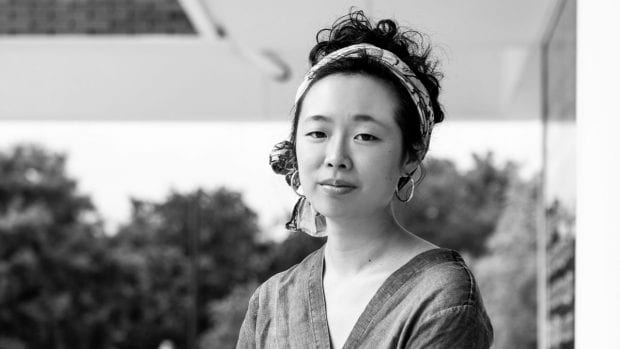Who should practice medicine? Who should vote? And how do protests influence plagues?
The urgency is implied in the name, and that’s by design. Humanities NOW, an ongoing series of online discussions hosted by Fay Yarbrough ’97, associate professor of history and associate dean for undergraduate programs and special projects in the School of Humanities, is driven by society’s need for real-world application of humanities skills.

Fay Yarbrough ’97, associate professor of history and associate dean for undergraduate programs and special projects in the School of Humanities, speaks to incoming freshmen during the 2018 matriculation.
Humanities inquiry — the way in which questions are asked and explored — can address all manner of current dilemmas we face as a species: questions of the ethics of vaccine distribution, the nature of partisanship, the human vector in the spread of diseases such as COVID-19, historical precedents (and potential solutions) for political plights and more.
Lan Li, assistant professor of history and medical humanities, will present the first of four spring Humanities NOW talks — each of which are open to the public — Jan. 28 on the topic of “Needle and Thread: Medical Histories and the Asian Diaspora.” By providing a global perspective on what is commonly known as “Chinese” medicine, such as acupuncture, Li’s talk will explore questions in the history of medicine: Who is medicine for? Who is allowed to practice it?
“My goal in in terms of attracting students — including potential Rice students — to humanities classes is to let them know we’re answering all the important questions that you are asking about the world around you,” Yarbrough said.
Three of the four Humanities NOW discussions this semester will center around medical humanities, one of the fastest-growing programs at Rice and a vital field for studying and responding to our current situation: over 400,000 Americans dead due to COVID-19.

Lan Li, assistant professor of history and medical humanities, will present Jan. 28 on the topic of “Needle and Thread: Medical Histories and the Asian Diaspora.”
Kirsten Ostherr, chair of the Department of English and founding director of the Medical Humanities Program, will present her ongoing research on “Translational Humanities for Public Health” Feb. 11. As the pandemic persists, doctors have increasingly turned to collaborations with humanities scholars to cope with the scale of the tragedy — something Ostherr’s team in the Medical Futures Lab has been documenting with an ongoing survey.
Travis Alexander, postdoctoral fellow in medical humanities and member of the Rice Academy of Fellows, will present Apr. 7 on “Plagues and Protests,” two topics which have long intertwined. Our current level of access to the kind of experimental drugs used to treat novel coronavirus, for instance, can be traced to the AIDS protests of the 1980s.
Pulitzer Prize-winning history professor Caleb McDaniel will present another highly topical talk March 11 on “Who Should Vote.” The history of suffrage is not one of unbroken progress, McDaniel points out, but of continuous protest and struggle to determine what makes a person a citizen in the ever-changing eyes of American democracy. To understand the importance of a figure like Stacey Abrams, for example, is to understand the history of voting rights in Georgia and the U.S. South.
“If you look at people’s research and work (in the School of Humanities), they’re all asking these questions about the human experience that are the kinds of questions that our students are interested in — and that, really, the larger public is interested in as well,” Yarbrough said. “I think that there are so many questions that people have about the present moment that are answered through the humanities, and that’s what I hope that those conversations are showing people.”
For more information about the Humanities NOW online discussions, visit humanities.rice.edu/humanities-now. Each talk is free and open to the public, but registration is required.

